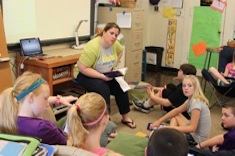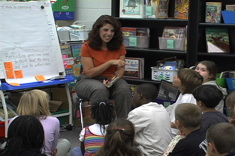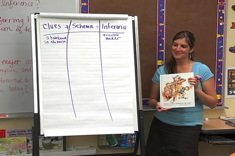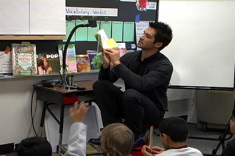I love summer reading. I love the freedom to read what I want, and catching up on books I’ve been meaning to read. And I love having time to browse and discover new titles and authors. It is a relaxing time for reading, except for one thing. Each summer, I am on a quest to find the perfect first read aloud. Up until that first day of school, I am always still pondering. Read aloud is such an important routine in our classroom, and those first weeks of school set the stage for powerful conversations throughout the year. I am not one of those teachers who starts every year with the same book.
The read aloud routine will eventually look like this: The entire class sits in a circle in our meeting area. There may be charts on the wall to track our thinking. Students have notebooks on their laps, collecting their thoughts. I read aloud and we stop to talk often. Children lead the conversation, and this is a time when they learn to think through a text on their own, with a community to support them. I teach from the conversations that arise, not from a predetermined plan I’ve created.
I need to find a book that invites all kids into a conversation. On that first day of school, I never know how kids have been taught to respond to a book, how comfortable they are with talking about their thinking in a group, or how open they are to others’ thinking. Those first few weeks of read alouds provide an opportunity to learn about ways students talk around book — an assessment of sorts.
I never know until summer’s end exactly how this new year will begin, but I do know that kids will not be comfortable right away.
When I think about what I am looking for in a book, the list is a long one:
I want a book that is short, or at least not too long. I know in those first few weeks of school, as we get to know each other and I learn about the students as readers, I will know just where to take us in read aloud. I don’t want a book that lasts so long that we can’t move to the next book quickly. I know the conversation around the first book won’t be as powerful as they will be as the year goes on, and I want to have the option to move to our second book as soon as I know where to go next.
I’m looking for something somewhat new that kids most likely have not read. I don’t want a book that’s already been made into a movie that kids may have seen. I do want students to understand the power of rereading but when the community is new, I want to even the playing field by sharing a book that is fresh for everyone.
I want a book that I don’t know too well — preferably one I’ve never read with children. If I want read aloud to be a time for kids to build their own thinking, I can’t be too attached to a book that I read aloud. I’ve learned over the years that when I read a book I’ve read to other classes, it is usually because it was a successful read aloud. I am hoping for a similar conversation with a new group, and I push the other class’s thinking on the group, taking away the possibilities for new conversations that will help me learn about students. I find myself talking more, and listening less, when I use a book that has worked well in the past.
I want a book that has many possibilities for talk. I like to choose a plot-based book because most elementary students are comfortable predicting, retelling, and talking about what’s happened. But I look for other opportunities to build conversation as well. I’d like a character that changes, and some unique text elements such as a map or table of contents that readers could use to comprehend the book. I want there to be features that invite visualization for kids who might be comfortable drawing. The more options for talk and thinking, the better our read aloud time will be all year long.
I’m looking for a book with some depth, but not so much that it is over anyone’s head. It is tempting to read something with lots of depth for that first read aloud. But until I know how a new group responds to books, I don’t want to overreach. I want every child to feel successful and to look forward to this time of day. I want to pick something on the easy side, with lots of different avenues for thinking and conversation.
I often have my most reluctant readers in mind when I choose the first read aloud. I want it to be so engaging and fun that they feel successful and look forward to read aloud time. I am confident that every child will have smart things to say about any book, but I want everyone to be comfortable doing so, no matter their past experiences with reading.
I want a book with very few real-life heavy issues. I don’t know the children in my class yet, and I have little knowledge of their home lives. I want to be careful until I know the students and our community is strong. I remember years ago late in the school year the class was deciding our next read aloud. I had given students a few books to choose from. During our previewing, we discovered in one of the books a family member of the main character had recently died. A student spoke up and said to the class, “My grandfather is really sick right now and I don’t think I can read a book about a family member dying.” The class immediately understood and chose another book. I don’t want to force anyone to deal with an issue they are not quite ready for during those first weeks of school.
Finally, the book has to have some humor — preferably some laugh-out-loud moments. Humor helps everyone feel comfortable in a new community. It also gives an important message about the way we will be together. Laughing together matters, and laughing together around a book is one of the best kinds of laughter in a classroom.
Here are a few titles I’ve been thinking about for the first read aloud. I know there will be others I consider as the summer winds down. All of these texts could make great read alouds at some point in the year. No matter which one I pick, they will all remain on my menu of possibilities for future read alouds, book clubs, and recommendations to individual students.
Horten’s Miraculous Mechanisms by Lissa Evans is the story of Horten, who moves to a new city with his parents. While he is there, he discovers that he had a great uncle who was a magician, and that his workshop is hidden somewhere in the city. Horten goes on a quest to find the workshop, and makes some friends along the way. The end pages of this book provide a map to the city, which would add some visual information to our talk. This story is just plain fun, and it looks like it will be the first in a series.
Capture the Flag by Kate Messner is a mystery of sorts about a trio of children who meet while stranded in an airport. Someone in the area has stolen the American flag from the local museum, and the three go on a search to find a thief. This is a plot-based book with lots of action that kids would enjoy.
Emily’s Fortune by Phyllis Reynolds Naylor is the story of Emily, who has lost her family and is sent to live with an aunt across the country. But the journey is not an easy one, and she has to escape lots of people trying to find her. The cliffhanger chapter headings make this a story that would naturally invite conversation.
Children love books about animals that talk, and The Adventures of Nanny Piggins by R. A. Spratt is one of those stories. Nanny Piggins is a pig and a nanny to three children, and she doesn’t do her job very well. She likes to have fun, and she wants the children to have fun too.
Justin Fisher Declares War! by James Preller is one that’s been on my list of possible first read alouds for a few years. This is the story of Justin, the class clown. Being a class cut-up isn’t working for him anymore, as his friends are growing more mature. I like this story because James Preller understands this age so well. Even though there are lots of fun scenes in the story, Justin is also maturing in surprising ways. There are many possibilities for talk in this short novel.
I am spending my summer creating a list of pros and cons in my head for each book. I am reading books that sound like they might be the perfect fit, and I am asking other teachers about books that they’ve read aloud as I continue my quest. I won’t make my final decision until the very last day of summer. But the journey to find that perfect first read aloud is introducing me to lots of new books, and helping me envision wonderful possibilities for read aloud time this year.









